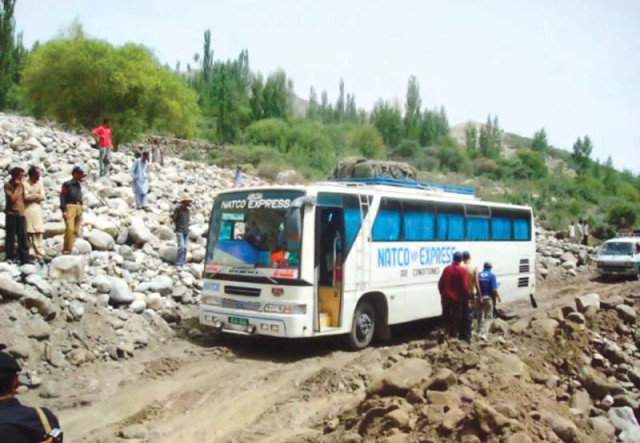Traders’ woes: ‘G-B should be declared a free trade zone’
Traders demand compensation; exemption from sales tax, custom duty.

Already disaster stricken, traders of Gilgit-Baltistan (G-B) have demanded of the federal government to declare G-B a free trade zone.
GB’s trade solely depends on the Karakoram Highway (KKH), which connects Gilgit with China, but the trade route was cut off after a massive landslide at Attabad in Hunza on January 4, 2010, which left 23 kilometres of the road and a number of villages completely submerged under the artificial Attabad Lake. All forms of trade were severely affected and it is estimated that the region’s traders have suffered around Rs2 billion in losses since then.
Talking to The Express Tribune, G-B Chamber of Commerce and Industry’s (GBCCI) President, Javed Ahmed, said that subsequent disasters in G-B “ruined all businesses in the area” including trade, tourism and other economic activities, pushing people into extreme poverty and economic degradation. “The cost of business has doubled due to the boat services at Attabad Lake, substantially decreasing profit margins for businesses,” said the GBCCI president. He demanded that the government declare G-B a free trade zone by exempting Sost Dry Port from sales tax and custom duties in a bid to facilitate and compensate local traders.
He claimed that despite paying taxes and custom duties at Sost Port, traders are illegally charged custom duties at Dasu, Abbottabad and Haripur, while on their way to Rawalpindi, even though all such trade barriers had been abolished in 1998 on the directives of then Prime Minister Nawaz Sharif, he added.
He said that in the wake of 9/11, 2001 and with the prevailing law and order situation, G-B has rarely seen foreign tourists in the past decade, leaving tourism, another core source of income, in a state of disarray. He said that the local and the federal governments did not take prompt steps to restore the KKH, which resulted in disruption of all activities in the region.
He urged the government to introduce a compensation package for G-B similar to the one given in Swat and other disaster-stricken areas to revive the local economy. The compensation could include writing off of business loans, exempting traders from taxes and facilitating foreign investment in the area to harness its mineral, power and tourism sectors. To boost tourism, the government must ensure the expansion of airports, introduce all-weather flights and highlight the tourism potential of the area, he added.
Ahmed noted the dire need to establish an export processing zone in G-B to facilitate value addition for local products. He said that in the absence of an export processing zone, large quantities of fruits and vegetables are destroyed before reaching the market.
Besides, Ahmed said GBCCI had prepared a feasibility report for establishing a cement factory in G-B, but the project could not be initiated as the federal government could not invest Rs1 billion. He said the project will not only benefit G-B’s people, but will also reduce construction cost on Bhasha and other proposed dams due to the lower transportation cost between a local factory and the dam sites.
Published in The Express Tribune, May 30th, 2011.



















COMMENTS
Comments are moderated and generally will be posted if they are on-topic and not abusive.
For more information, please see our Comments FAQ